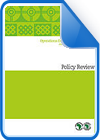Objective
This case study forms part of the evaluation of policy based lending in the African Development Bank (AfDB) from 1999-2009. It is one of four case studies of specific operations that have been carried out as part of the evaluation:
- Botswana Economic Diversification Loan (approved 2nd June 2009). This is by far the largest PBO over the evaluation period representing about 22% of the total value of PBO approvals between 1999 and 2009, and is now the largest loan ever made by the Bank.
- Nigeria Economic and Power Sector Reform Programme (approved 1st October 2010). This is the largest sectoral operation in Sub-Saharan Africa.
- Egypt Financial Sector Reform Loan (approved 26th July 2006). This is the largest sectoral operation over the evaluation period and was at the time the largest loan ever made by the Bank.
- Democratic Republic of Congo Emergency Programme to Mitigate the Impact of the Financial Crisis (approved 1st May 2009). This is a major recent operation in a fragile context.
These case studies were selected (to complement the six country case studies) because they represented particularly large operations that have accounted for a significant proportion of the Bank’s commitments under policy based operations over the evaluation period, or in the case of the DRC programme because only one fragile state was represented in the country case studies. These case studies have been carried out through a desk review of documentation, and through interviews with AfDB staff. They have not involved country visits or interviews with RMC counterparts.
These case studies were selected (to complement the six country case studies) because they represented particularly large operations that have accounted for a significant proportion of the Bank’s commitments under policy based operations over the evaluation period, or in the case of the DRC programme because only one fragile state was represented in the country case studies. These case studies have been carried out through a desk review of documentation, and through interviews with AfDB staff. They have not involved country visits or interviews with RMC counterparts.
Main Lessons
- The acceptability of using fairly light-weight formal tranche release conditions provided that there is real trust in the programme of the RMC
- The need to have realistic time-limited standards on all internal Bank procedures that are wholly under the control of the Bank and to be realistic too (not aspirational) about the time that procedures under the control of the borrowing country might require (e.g. approvals from the local Parliament)
- The acceptability of a GBS operation that is nominally designed to respond to a fiscal need, being re-presented as an operation designed to support a well-defined structural programme but only where such a programme exists, is credible and commands real trust. As was noted above there was little apparent connection between the substantive request from the GoB on March 27th 2009 and the structural package that emerged a few weeks later to constitute the EDSL
- Lessons about the limits of the possible in mobilising appropriate teams from different organisation parts of the Bank and how seniority/reporting issues can best be addressed in such teams
| Attachment | Size |
|---|---|
| 393.23 KB |


